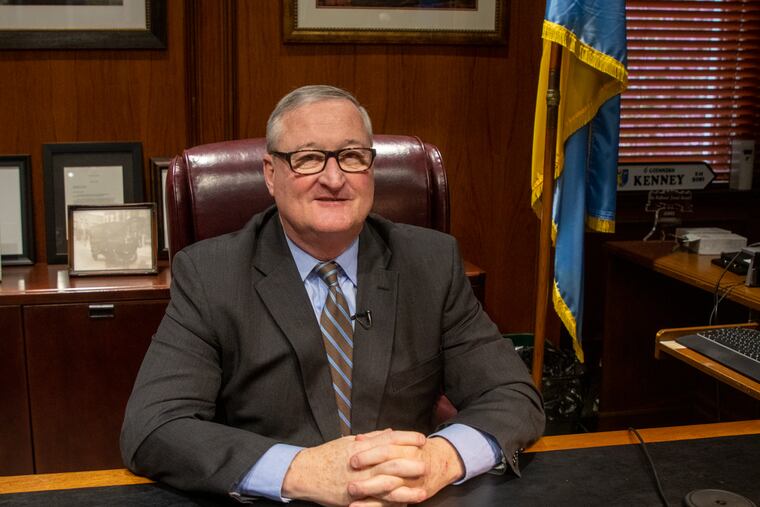Kenney’s city budget is a return to normal — at least for now | Editorial
Kenney wants us to believe that everything will be fine, but we'd be more optimistic if the city acknowledged the need to be better prepared for future shocks.

Don’t worry, everything will be fine.
That’s the main message conveyed in the new $5.1 billion city budget proposed by Mayor Jim Kenney to City Council on Thursday. That’s about the same amount that was proposed in March 2020, practically minutes before the pandemic hit the world, shut down the economy, and forced a $749 million budget retrenchment.
In the new budget, pools will be open, libraries will be restored to five days a week, streets will be swept, roads will be paved, schools and the cultural fund will get more money, as will a number of programs dealing with gun violence, workforce development, and more. There will also be minor cuts in wage and business taxes.
This feat of magic is due to a huge influx of federal dollars, in the form of a $1.9 trillion American Rescue Plan that will bring $1.4 billion to Philadelphia. Of course that’s a relief – without that money, the story would be grim, if not disastrous, with layoffs, service cutbacks, and tax increases.
» READ MORE: Kenney sees ‘hope for an eventual return to all that makes Philadelphia great’ in annual address
As the pandemic forced the shuttering of businesses, consider the devastation wrought by loss of wage taxes, the biggest source of tax revenue for the city. According to a recent analysis by Controller Rebecca Rhynhart, $257 million in lost wage tax revenue was driven by unemployment, as well as the shift to a remote workforce. That meant nonresidents – 40% of the wage tax base – are entitled to wage tax refunds. And it’s likely that much of that remote work will continue into the rest of the year and possibly beyond.
The reliance on the wage tax has left the city particularly vulnerable. According to a recent Pew report that studied the pandemic’s impact on municipal budgets in 13 cities, the city’s budget shortfall as a percentage of its general fund — at 14.7% — was second only to Detroit. Other cities that rely more heavily on property taxes have been buffered – Boston, for example, has only a 1.9% gap between its shortfall and its budget.
While the new budget includes minor trims to the wage and business taxes, the temporary relief afforded by the federal dollars should prompt a more thorough rethinking and restructuring of our tax policy. (It’s worth noting the reduction in the wage tax follows a hike of that tax for nonresidents just a year ago.)
It’s good news that there will be relief from the profound suffering the city has experienced in the last year. And yet we can’t help being disappointed that the federal money is enabling an apparent return to “normal.” After all, “normal” was a budget that grew by $1 billion in Kenney’s first three years. With a resistance to doing anything but tinkering around the edges of tax policy, “normal” wasn’t necessarily “healthy” or “forward thinking.” And the new budget calls for a dangerously low fund balance.
Surely, ours is a city of great need, with high poverty, high gun violence, and racial inequalities, and the mayor has specifically addressed these in his budget address. There will be more money and focus on Black and brown entrepreneurs, and money to fight gun violence and support other social programs. The police budget will be flat-funded. The feds will be providing additional direct support that will help alleviate poverty – including a child tax credit and increases to the Earned Income Tax Credit.
Another positive development includes plans for more public input into the budget process, with sessions and community engagement. That is part of the mayor’s attempt to grapple with racial disparities in health, public safety, and economic and educational outcomes. For too long communities of color have been ravaged, and that has held the city back.
» READ MORE: Who decides Philly’s budget? Here’s how the process works.
But it’s important to remember the federal dollars are a one-time infusion to tide the city over until the economy recovers. The assumption that the city will recover completely, magically returning the same as it was pre-pandemic, is misguided After all, the retail sector has been battered. Workers are unlikely to return to offices fully anytime soon. What pivots and new ways of thinking are necessary to compensate for this disruption?
The last year has been staggering in its challenges to citizens and the city’s leaders. We can all be relieved that Philadelphia has avoided a doomsday scenario, but we would be more optimistic if the city acknowledged the need to become better insulated against future shocks.